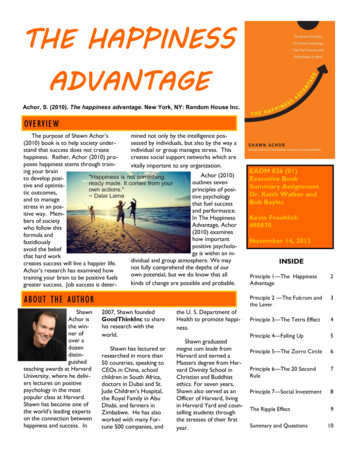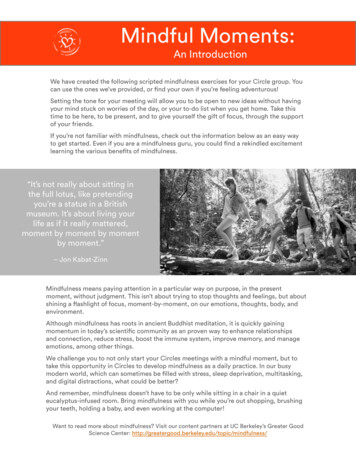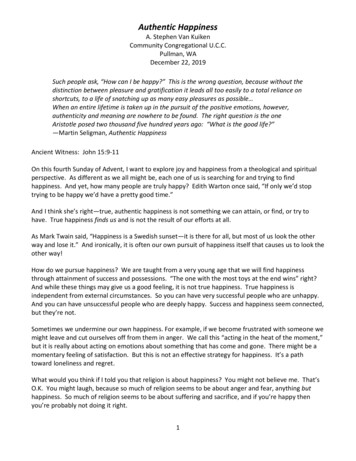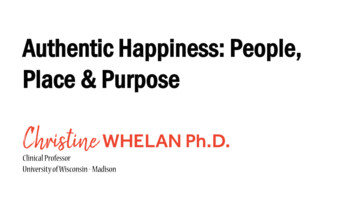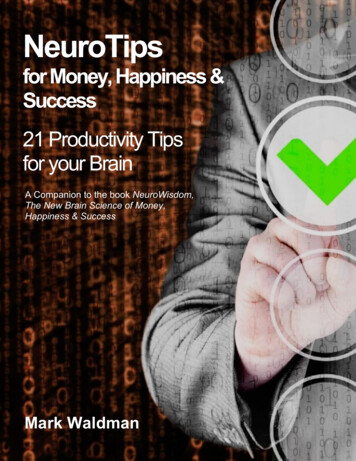
Transcription
NeuroTipsfor Money, Happiness &Success21 Productivity Tipsfor your BrainA Companion to the book NeuroWisdom,The New Brain Science of Money,Happiness & SuccessMark Waldman1
NeuroTipsfor Money, Happiness & Success21 Productivity Tipsfor your BrainA Companion to the bookNeuroWisdom, The New BrainScience of Money, Happiness& SuccessMark WaldmanExecutive MBA Faculty, Loyola Marymount University2
NeuroTipsfor Money, Happiness & Success21 Productivity Tipsfor Your BrainByMark WaldmanExecutive MBA Faculty, Loyola Marymount University 2017 by Mark WaldmanAll Rights Reserved.1601 Carmen DriveSuite 203Camarillo, CA ublished by VanBurenPublishing. Editing, coverdesign and interior by VanBurenPublishing. AllRights Reserved.For more high-quality mini-ebooks, visit:www.VanBurenPublishing.com3
Mark Waldman is one of the world’sleading experts on communication,spirituality, and the brain. He is on thefaculty of the Executive MBA program atLoyola Marymount University’s College ofBusiness and the Holmes Institute.Mark has authored 14 books, including thenational bestseller, How God ChangesYour Brain, an Oprah pick for 2012. Hisresearch has been published throughoutthe world and featured in Time, theWashington Post, the New York Times,Forbes, Entrepreneur, Investor’s BusinessWeekly, and Oprah Magazine.Mark lectures throughout the worldteaching communication, conflict resolution,and productivity-enhancement strategies toschools, corporations, and spiritualorganizations. His clients include worldrenowned universities, psychologicalassociations, educational institutes, andgovernment/civic organizations. He hasappeared on PBS Television and NPRRadio, and he received the DistinguishedSpeaker award from the Mind ScienceFoundation.4
Introduction NeuroWisdom(n(y)o͝o-rō-wiz-dəm)Tapping Into the Hidden Knowledge of YourBrain to Bring Greater Happiness, Wealthand SuccessBehind the folds of your neocortex are special neurons thatgive you profound powers of perception. They enhance yourability to be self-directed and socially aware, but you have to“exercise” these newest evolutionary circuits of the brainthrough a unique combination of relaxation, mindfulness, andintuition. When you do, using the simple strategies in thisbook, something remarkable happens: negative feelings andthoughts are transformed into optimism, your motivation andcreativity increases, your decision-making skills areenhanced, and your ability to empathize with others rapidlygrows. Compassion increases, self-love soars, and a new“voice” can be heard, one that will guide you toward greaterawareness and serenity.We call this inner awareness NeuroWisdom. It is your innerteacher and spiritual compass, one that will help you achievemore goals, more passion, and more satisfaction in yourrelationships and work. Nurture this delicate circuit in yourbrain, using the following tips and strategies, and you willenlighten and enrich your life.51
1. RelaxIf you want to remain focused and productivethroughout the work day, you should take three 10second relaxation breaks each hour. The decisionmaking processes in your frontal lobe get exhaustedafter 10-20 minutes of concentration.What are the three fastest ways to relax and refreshyour busy brain?Yawning, super-slow stretching, and gentle strokingof your hands and arms. Yawning slows downexcess activity throughout your brain that causesneurological stress. Super-slow stretching of yourneck, shoulders, arms, and torso allows your brain tosend a relaxation signal to tense muscles, and itbrings you into the present moment where betterdecisions are made. Very slow touching of yourforearms and hands decreases negative emotionswhile stimulating the confidence centers in yourbrain.Download a mindfulness clock onto your computerand cell phone, setting it to go off three times eachhour. Search “mindfulness timer” to find someoptions you can download.6
2. Use a MindfulnessClock at WorkWant to lower stress and increase productivity in lessthan a minute? Want to make your daily routines moremeaningful and valuable? Want to experience morepleasure, joy, and satisfaction, even when you areperforming a difficult or boring task? Download aMindfulness Clock onto your computer and/or phone andset the bell tone to ring 2-3 times each hour. When youhear it, take 10 seconds to slowly stretch, and yawn. Atthe top of each hour, take 60 seconds to do somethingpleasurable and reflect on a deep inner value. Meditatefor a minute. Daydream. Run for 60 seconds. Doanything you find enjoyable. Then throw yourself backinto work. My Executive MBA students at the businesscollege at Loyola Marymount University found this to beone of the most important tools for reducing work stressand increasing productivity. You are literally bringingyour meditation practice into the workplace, where youneed it the most!Remember: The National Institutes of Health and theWorld Health Organization state that stress is the #1disease in the world, and it only takes a few seconds toyawn, stretch and refresh your brain for achieving peakperformance for the next hour of work! Use a mindfulnessclock along with any brain-training or therapy program(it’s an integral part of NeuroWisdom 101, my audiotraining program in mindfulness and positivity), and eachtime you hear the bell, just pause for a few seconds torelax and bring yourself into the present moment. Yourstress levels will instantly drop and your performance andproductivity will soar.7Here are some populardownloads for yourcomputer and cell phone:Computer: Try using either ofthese ulnessdc.org/mindfulclock.htmlPopular phone apps:Try the app at InsightTimer.com –it’s free and works for iphonesand androids.Go to Google Play or iTunes andsearch for “mindfulness bell”“mindfulness clock” or“mindfulness app”
3. Live Your ValuesIf you want to eliminate stress throughout the entireday and improve the quality of your work, askyourself this question every morning:“What is my deepest innermost value?”At our College of Business, where I teach, 90% ofour students – who run multi-million dollarcorporations – report increased work satisfactionand a substantial decrease in stress. If you reflecton your personal, business, and relationship valuesseveral times throughout the day, you’ll feel happierand more capable of dealing with difficult issues andconflicts.Repeating a positive value word (like peace, love,integrity, confidence, etc.) for 5-10 minutes will turnon as many as 1200 stress-reducing genes.8
4. Daydream & TakePleasure BreaksWork burnout is one of the largest problems in business.Our neuroscientific research shows that if you take 60seconds once each hour to do anything pleasurable(stretching, aerobics, washing your face, anything youenjoy), the dopamine that is released from yourmotivation center in your brain will allow you to workharder and more efficiently to achieve the goals youdesire.Pleasure actually increases consciousness andeliminates negative emotions like anger and fear. Afteryou take a pleasure break, or whenever you feel stuck,lean back in your chair and let your mind wander anddaydream for a couple of minutes. This allows your brainto creatively find solutions to any problem you arestruggling with.All you have to do is to watch how your thoughts andfeelings flow in and out of consciousness as you remaindeeply relaxed.9
5. Trust YourIntuitionYour right prefrontal cortex is constantly generating worriesabout things that could go wrong as you work toward achievingyour goals. It’s the “pessimist” in your brain!Simultaneously, your left prefrontal lobe is constantly generatingsolutions to any imaginable problem. This is the optimistic“voice” that keeps you going!There’s a continuous word-based dialog going on, and if youlean back in your chair and use your imagination to listen to thisinner speech; you can then use your intuition to weigh andevaluate the best action to take. This is the voice of innerwisdom, a very real neurological process that takes place in theinsula and anterior cingulate. It’s not a word-based awareness,but it’s the most trustworthy sense humans have, and you can“exercise” it through different forms of meditation andmindfulness-based strategies.10
6. Keep a Daily Listof AccomplishmentsThe brain registers small goals the same as large ones. If youfail at a big goal, you can easily trigger the release of stresschemicals, whereas every small accomplishment releasesdopamine and motivates you to achieve more success.But you have to deliberately become conscious of them!At the end of the day, write down all your smallaccomplishments and then take 2-3 minutes to savor them.Research shows that if you do this for just one week your selfesteem will continue to grow over the next 3 months!11
7. Keep a GratitudeJournalResearch shows that keeping a daily gratitude journal eliminatesfeelings of worry, fear, and irritability.At the end of each day, write down 3 things you feel grateful for –people you appreciate, things you value about your life, etc. Thenrepeat the following phrase: “May I be happy, may I be filled withpeace.”When you feel angry toward someone, repeat “May you be happy,may you be filled with peace,” and continue to do so (no matterhow much resistance you might feel) until your anger dissipates.12
8. A BusinessMeditationMost meditations are geared toward relaxation, inner values,and spiritual awareness. But you can use concentration andaffirmation strategies to increase work performance.First identify key words or values that you feel would helpyou overcome a problem or resolve a specific conflict(examples: peace, confidence, concentration, success,power, knowledge, patience, integrity, etc.). When yousilently repeat one of these “power” words, your brain will pullup past memories associated with that quality.Try this “recipe” at the beginning of a busy workday, or whenyou are feeling stressed out by a specific problem: Find asingle word that captures the quality that will help yousucceed. Use that word in this phrase: “I breathe in .”As you breathe out, you can use another positive word, oryou can think of a quality you want to eliminate. Examples: “Ibreathe in confidence; I breathe out stress.” Or “I breathe inpower, I breathe out integrity.” Repeat this phrase for at least60 seconds. You’ll immediately feel more capable ofachieving any goal you desire. Why? Your ancient emotionalbrain responds to any thought you have – positive ornegative, real or imaginary – as though it was an actualstimulus in the world.13
9. Boost YourPositivity Ratio 5:1Negative thoughts and feelings are easily encoded into long term memory, butpositive thoughts barely leave a trace. Why? They aren’t a threat to your survival.Brain-scan research shows that even seeing the word “no” for less than a halfsecond will release dozens of stress chemicals into your body and brain. BarbaraFredrickson’s research found that you have to generate at least three positivethoughts for every negative thought and feeling you have if you want to besuccessful in relationships or business.But when you push your positivity ratio to 5:1 or 7:1, your relationships becomedeeply satisfying (John Gottman's research) and your business productivity soars(Losada's research).Spend a single hour writing down every positive and negative thought you have,and calculate what your positivity ratio is. If it is below 3:1, your relationships andyour business are in trouble. But here’s the good news: each time you catchyourself thinking or feeling something negative, just think about three positive thingsyou like about yourself. You’ll actually interrupt the formation of negative memories!14
10. Don’t ProcrastinateAbout ProcrastinationWe all want our dreams to come true but many people hesitate before taking action. Theyprocrastinate, uncertain of what to do. Most procrastination is based on an irrational fearthat something may go wrong and it’s usually driven by self-doubt or poor self-esteem.Other forms of procrastination are healthy: it’s is your brain saying “look before you leap.”Even pigeons procrastinate, and the more complicated the task, the longer the birds delaytaking action! But “night owls” – people who stay up late – tend to procrastinate more.If you are facing a real problem, business psychologists have found that “active”procrastination makes you more successful. It gives you time to assess the situation andgather more information before making an important decision. But if you excessivelyworry about small decisions, it will interfere with your memory and sour your personality.There’s also a powerful connection between perfectionism and procrastination. For theperfectionist, it’s never good enough, and that form of thinking undermines confidenceand self-esteem.When you catch yourself procrastinating, take out a sheet of paper and write down, asbriefly as possible, the inner dialog generated by the procrastination. List all the reasonsfor not taking action, and then mindfully gaze at your list as you stay deeply relaxed andnonjudgmental.Then ask yourself "are any of these reasons valid?" Most won't be, but some may be true.For those that are true, write down three small strategies that would lead to the resolutionof your hesitancy.Writing interrupts the repetitive inner speech that causes our motivational centers tofreeze. Some procrastination is just an anxiety based on past unrelated events (i.e.,memories), but other forms of procrastination is simply your brain telling you that youneed more information before making a wise decision.Remember: you can never have enough information to guarantee future outcomes, soyou must trust your intuition and make a leap of faith.15
11. Perfectionism LowSelf-EsteemDo you have a fear of failure? You just might be a perfectionist. Perfection,as an ideal, is a wonderful notion to strive for, but perfectionists are oftenpeople with low self-esteem and they are often more afraid of theembarrassment and shame that they may feel as a result of a failed goal oractivity.Many studies have shown that perfectionism is related to depression,anxiety, obsessive-compulsive behavior, poor listening skills, andmicromanagement. It correlates with insomnia and eating disorders, and it isdirectly related to fear of failure.We all have varying degrees of perfectionism, so try this experiment: Giveyour inner critical voice a name and interview it. Ask it why it’s so importantthat you drive yourself to perfection. Often you’ll hear how silly your innercritic sounds, but sometimes you’ll find sage advice. Make “suggestions” toyour inner negativity, or ask it what you should do. Sometimes the feedbackis useful; other times it will become clear that the inner critic is just amemory from the past.Our research on inner speech shows that if you use your imagination, youcan actually hear all sorts of “should” voices that have been stored into longterm memory. You’ll also realize that most of those critical voices come fromparents, teachers, and childhood encounters.REMEMBER: When you finish a task, and you think it’s not perfect, interruptthat thought by focusing on what you have done well. If, at the end of theday, you write down all of your tiny daily successes, you’ll sleep moresoundly and wake up with more energy, propelling you into anothersuccessful day.16
12. Will Power is aWinning FantasyMany research studies have found that that the “harder” we work to changeour life, the less likely we are to succeed! Often our desire to succeed isbeing propelled by a fear of failure, or a fear that we might not be goodenough. These “I should” and “You must” voices create inner conflicts thatinterfere with work performance.But a recent Stanford University research study discovered that peoplewho have a deep-seated belief in UNLIMITED willpower are far more likelyto succeed. They are more likely to overcome procrastination, changeunwanted behaviors, and achieve the goals they desire. People whobelieve they have a limited source of willpower display a lower ability toexercise self-control. So no matter what the obstacle is – big or small –know that deep down inside, you have the power to persevere, no matterwhat! That’s the power of belief, and willpower is a state of mind!NeuroTip: to increase willpower, first choose a goal you want to achievetoday, this week, or this month. Write it down. Then create a personal briefaffirmation telling yourself that you have all the power in the world tomanifest your goal. Turn your “I shoulds” into “I wants,” but make sure it’sa genuine desire. Instead of saying “I must,” say “I will.” Try it right now.Think about a task you normally struggle with and visualize doing it as yourepeat these sentences over and over: “I should do better I mustsucceed I have to work harder.” Notice how you feel.Now repeat these sentences as you visualize doing the same task: “I willdo this task with ease I will fill myself with pleasure as I do this task .Ilike this task I want to do this task I will succeed.” It’s the samevisualization, the same job, but notice how much better you feel! You’re onyour way toward building unlimited willpower – just by changing the wayyou think!17
13. Don’t MakeHappiness Your GoalResearch shows that people who strongly pursue happiness tend to beclinically depressed. Happiness is an abstract concept, and the brain cannotachieve goals without clear concrete images of what that desire might be. Sodon’t focus on happiness. Instead visualize various activities that will make youfeel happy.Try this wealth-building exercise (I teach this to my MBA students and theylove it!): Make a list of every activity you can think of that has made you happyin the past: in work situations, relationships, and recreational activities. Makesure you have 10-30 items on your list and then gaze at your list as you deeplyrelax. You’ll soon discover patterns in your life that have brought you the mostsatisfaction. Make a commitment to do one activity a day that makes you feelhappy.However, there’s another problem with happiness: the moment you feel it, itturns off the motivational center in the brain. So what’s the neuroscientificsecret to overcoming this problem? Promising yourself a big reward every timeyou accomplish an important goal. Your brain will anticipate the futurepleasure and release dopamine; a neurochemical that makes you work harder!Ultimately, the more you engage in meaningful work, especially activities thatbenefit others, the happier you’ll become.The latest Neuroeconomic research also shows that wealth predictshappiness. Here’s an exercise we developed to help you achieve both innerand outer wealth. Ask yourself this question: what would you do if you werethe wealthiest person in the world? Who would you help? What would youcreate to make this world more splendid? Immerse yourself the fantasy ofbeing wealthy and notice how you feel. And the things you would do with all ofthat money? That’s what will give your life true meaning and purpose.18
14. Surround Yourselfwith Kindness & ForgivenessWhen a friend or colleague excels, begin to repeat this affirmation toyourself: "May you be successful, may you be well, may you be filledwith joy and peace."The more respect and kindness you show to successful people, themore your brain will unconsciously emulate the best of what they aredoing. Result: you'll pick up their good habits.Tell them how thrilled you are and they will unconsciously reach outto help you become more successful. Research shows that thewealthier we become, the more we desire others to be successful.On the other hand, feelings of resentment toward others willundermine your health, happiness, and financial success.Unforgiveness disrupts the motivation centers in your brain, but thelatest neuroscientific research shows that forg
For more high-quality mini-ebooks, visit: www.VanBurenPublishing.com . 4 Mark Waldman is one of the world’s leading experts on communication, spirituality, and the brain. He is on the faculty of the Executive MBA program at Loyola Marymount University’s College of Business and the Holmes






